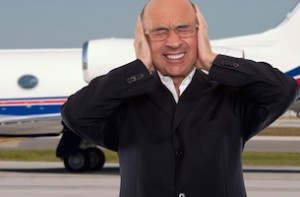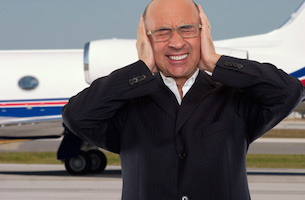 Air travel and ear discomfort go hand in hand. Ear popping or cracking is caused by an imbalance of pressure on either side of the eardrum within the ear and can range from mildly irritating to excruciating. Eustachian tubes in the ear control pressure and any inflammation of the tubes can exacerbate popping activity.
Air travel and ear discomfort go hand in hand. Ear popping or cracking is caused by an imbalance of pressure on either side of the eardrum within the ear and can range from mildly irritating to excruciating. Eustachian tubes in the ear control pressure and any inflammation of the tubes can exacerbate popping activity.
Babies and small children often find the sensation distressing and rather painful, based on the fact they start off at a physical disadvantage. Their tubes are small to begin with, allowing less room for compression.
Illness, even something mild like a cold, can intensify feelings of discomfort. Ideally, any travel should be undertaken in peak health – not only is it more comfortable – your whole trip will be more enjoyable if you are healthy.
In the fortnight leading up to any air travel, take extra care of yourself. Eat a good diet, high in fruit and vegetables, and supplement as necessary with vitamin c, echinacea and zinc to warn off viruses. Get plenty of rest (in between packing and preparation!) and keep your fluid intake high. Don’t be afraid to avoid people you know are unwell – explain that you have travel planned and that optimum health is your priority.
Viruses and bacteria are not the only nasties that contribute to ear trouble. Allergies can also cause congestion, so ask your GP about the best decongestant measure you can take, to keep your ear as clear as possible and avoid the irritation and misery of allergic reactions.
If you have a specific medical condition, discuss it with your GP and your travel insurance provider. A serious condition may need to be specified on your policy, or require variations to your cover.
Whilst on board an aircraft – there are a few things you can do to encourage good ear function.
• Chew gum
• Swallow
• Drink liquids
• Yawn
• Pinch your nose, close your mouth and exhale gently to “pop” ears
Young children will need to be prepared, it may be a good idea to pack lollipops for them to suck on during take off and landing, and teach them how to “pop” their ears before they need to. Pain can often cause distress, which limits their ability or interest in trying something new!
Your ears also play a role in motion sickness – nausea, vomiting and dizziness – be it in a plane, car, bus or boat. Motion sickness is primarily due to a disruption of the vestibular system in the inner ear, which modulates the body’s sense of balance and equilibrium.
Your eyes, ears and proprioceptors (tissues that provide the body a sense of spatial orientation) combine to interpret motion. Repetitive movement such as the swells of the sea can confuse the brain, scrambling the incoming information and cause motion sickness.
To prevent and alleviate symptoms of motion sickness:
• Face forward
• Look at the horizon or as far out as you are able
• Don’t read
• Avoid pungent smells
If motion sickness is a regular issue for you, ask your pharmacist or GP about remedies which will prevent the severity or regularity of symptoms. Check to see if there are side effects (some medications can make you drowsy, if you need to be alert (eg driving) shortly after your travels.
More travel comfort tips:
• Dress comfortably in layers and loose-fitting clothing
• Stay hydrated
• Avoid alcohol
• Walk around the plane every hour or so to stretch and avoid swelling or take regular breaks from car travel
• Bring your own pillow
• Bring your own seat blanket
• Wipe down tray tables, arm rests and seat belts with disinfectant wipes









Join the Discussion
Type out your comment here:
You must be logged in to post a comment.